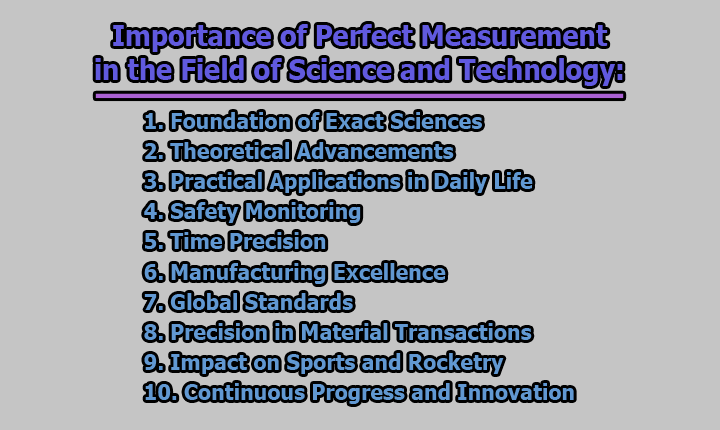Importance of Perfect Measurement in the Field of Science and Technology:
In the vast realm of science and technology, precision holds the key to unlocking the mysteries of the universe and enhancing our daily lives. The physical sciences, often referred to as exact sciences, owe their exactness to the fundamental concept of measurements. The study of all subjects in science and technology involves a meticulous process of measuring various quantities. In this article, we will explore the importance of perfect measurement in the field of science and technology.
1. Foundation of Exact Sciences: At the heart of disciplines known as the exact sciences, such as physics and chemistry, lies the fundamental concept of perfect measurement. These fields demand exactness in observations and experiments, and this precision is derived from meticulous measurements. The reliability and validity of scientific laws and principles are contingent upon the accuracy of these measurements, establishing a foundation upon which scientific knowledge is built.
2. Theoretical Advancements: Accurate measurement is not merely a procedural necessity but a catalyst for theoretical advancements. Scientific theories and laws are continuously tested and refined through experiments that hinge on precise measurements. In the scientific method, measurements serve as the empirical basis for validating hypotheses and formulating new theories. This iterative process of measurement and analysis propels the theoretical landscape forward, fostering a deeper understanding of the underlying principles governing the natural world.
3. Practical Applications in Daily Life: The impact of precise measurement transcends laboratory settings, influencing the minutiae of our daily lives. From the groceries we purchase to dealing with valuable commodities like gold and diamonds, measurements dictate the terms of our transactions. The size, volume, and mass of products are standardized through measurement, ensuring that consumers receive goods that align with specific criteria. In essence, measurement acts as a universal language in our material transactions, providing a standardized metric for value and quality.
4. Safety Monitoring: The meticulous measurement of environmental factors is critical for ensuring the safety of both the ecosystem and public health. Concentrations of pollutants in air and water must be measured with precision, often reaching parts per million (ppm) levels. This level of accuracy is vital in identifying potential hazards and implementing necessary measures to safeguard the well-being of individuals and the environment. In essence, precise measurements serve as the early warning system, allowing us to monitor and mitigate environmental risks effectively.
5. Time Precision: Time, a dimension that governs both our daily activities and industrial processes, demands precision in measurement. From sports events, where victories can be determined by milliseconds, to industrial processes requiring microsecond accuracy, time measurements play a crucial role. Precise time measurements are indispensable for synchronization, efficiency, and success in various fields, including sports, manufacturing, and the intricate processes of industries such as rocketry. In the quest for precision, time measurement becomes a critical element, influencing outcomes and ensuring the optimal functioning of diverse systems.
6. Manufacturing Excellence: The intricate machinery that permeates our lives, from household appliances to complex industrial equipment, relies on the precision of manufacturing processes guided by accurate measurements. In the manufacturing sector, strict measurement controls ensure that every component meets exacting standards. Any deviation in size can disrupt the seamless assembly of machines, emphasizing the necessity for uniform dimensions. Manufacturing excellence, therefore, hinges on the meticulous application of measurement principles, ensuring the reliability and functionality of the end product.
7. Global Standards: Accurate measurements are facilitated by globally accepted units and standards. The modern system of units, which evolved through gradual refinements over time, provides a standardized framework that transcends international boundaries. This common language of measurement fosters collaboration and understanding in the global scientific and technological community. It facilitates communication, comparison, and replication of experiments across diverse cultures and geographic locations, underlining the importance of uniform standards in advancing collective knowledge.
8. Precision in Material Transactions: In the realm of commerce, especially when dealing with high-value materials like gold and diamonds, precision in measurement becomes paramount. The integrity of transactions relies on accurate measurements, ensuring fair exchanges and preventing discrepancies. Whether determining the volume of liquids or the weight of solid commodities, standardized measurements play a crucial role in establishing the value and quality of materials in the market. The adherence to precise measurements in commercial transactions is essential for building trust and maintaining the integrity of economic exchanges.
9. Impact on Sports and Rocketry: In the world of sports, where victories are often determined by fractions of a second, precise measurements become the arbiter of success. From track events to swimming competitions, the accuracy of time measurements directly influences the determination of winners and record-breakers. Similarly, in the field of rocketry, where precision is synonymous with safety and success, measurements play a critical role. The duration of engine burns, separation of stages, and trajectory calculations all rely on meticulous measurements, ensuring the flawless execution of space missions.
10. Continuous Progress and Innovation: As science and technology continue to advance, the role of perfect measurement remains fundamental. It not only validates current knowledge but also paves the way for new discoveries and innovations. The pursuit of perfection in measurement ensures that our understanding of the world and our ability to create cutting-edge technologies continue to progress. The iterative cycle of measurement, experimentation, and discovery is the driving force behind the perpetual evolution of scientific and technological frontiers, shaping the future of human knowledge and capabilities.
In conclusion, the importance of perfect measurement in the field of science and technology is multifaceted and indispensable. From theoretical underpinnings to practical applications, measurements are the bedrock upon which the edifice of scientific understanding and technological progress stands. As we navigate the complexities of these dynamic fields, precision in measurement emerges as a guiding principle, shaping the future of discovery and innovation.

Library Lecturer at Nurul Amin Degree College










